If you mix a gentle giant and a family-friendly companion: you get a Sheepadoodle.
The Sheepadoodle is a gorgeous mix of an Old English sheepdog and a poodle.
They have an amazing personality and great looks; two reasons why they are popular family dogs.
Both parents’ breeds are intelligent and sweet-natured, so it won’t be long until this pooch becomes your best friend.
TABLE OF CONTENTS
Sheepadoodle Overview
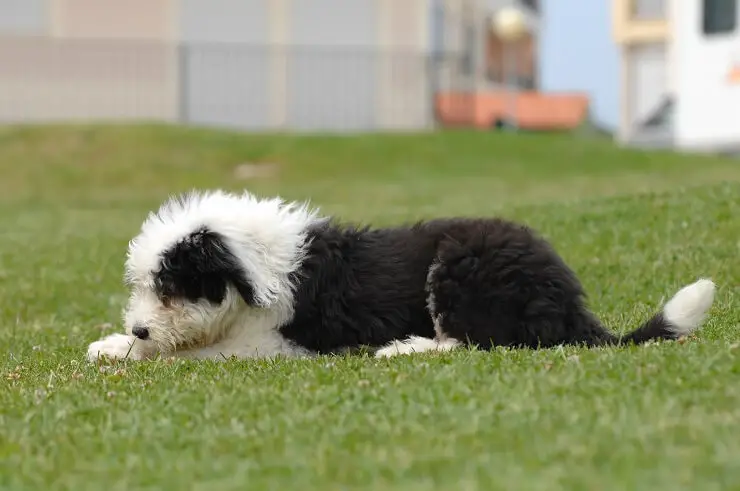
From Adobe Stock
English Sheep Dog PuppyA Sheepadoodle is an Old English Sheepdog and Poodle mix.
The name was first coined in 1992 but the mix first appeared back in the 1960s. They were most likely mixed to get the good looks and intelligence of the Old English Sheepdog and the family friendly nature of the poodle.
Both these breeds have a long history as working dogs. The Old English Sheepdog was used as a herding dog and the Poodle was used for fowl hunting.
They are both intelligent and energetic breeds so chances are your Sheepadoodle will be same!
Whilst the Sheepadoodle is not recognized by the American Kennel club as it is a crossbreed, but their parent breeds are recognized.
Sheepadoodle Appearance
As a crossbreed, their appearance can be a potluck. It all depends on what genes the puppy inherits from their parents.
Most Sheepadoodles will look like an Old English Sheepdog with curlier, soft fur. Their size is more dependent on their Poodle genes, but sometimes they can be bigger than a Poodle.
They have low hanging ears, small eyes and a friendly smile!
Their face can either be square like the Sheepdog or slightly domed like the Poodle.
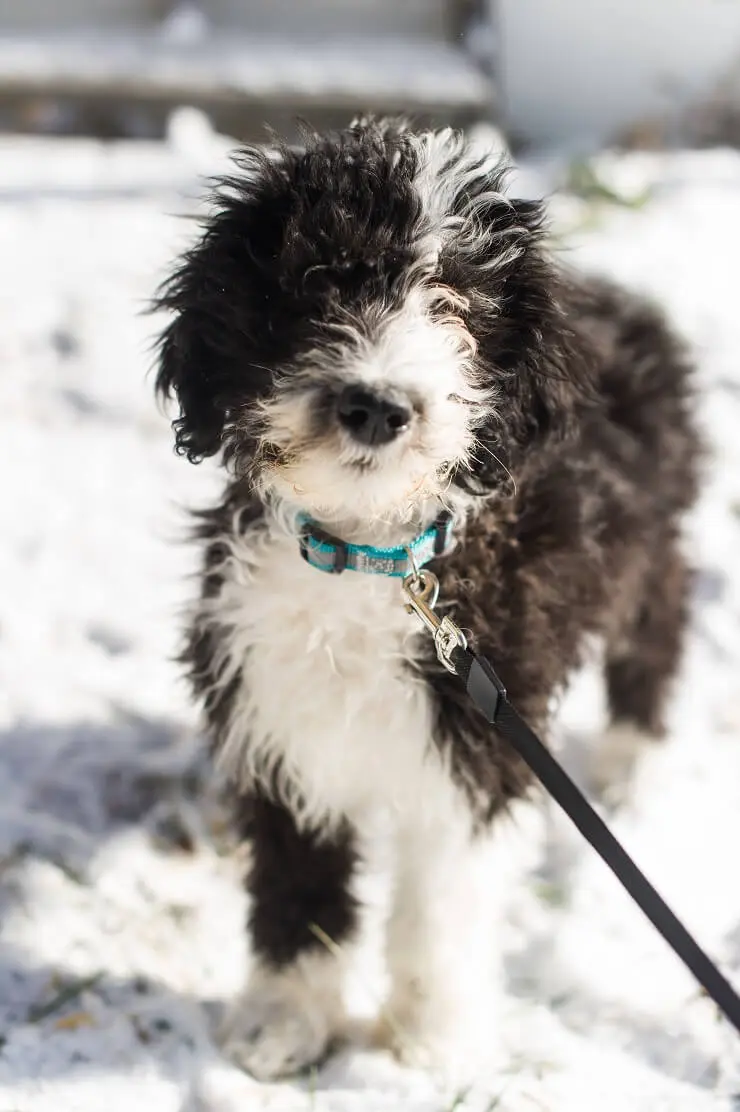
From Adobe Stock
Height and Weight
There are 3 types of Sheepadoodle based on their size. These are:
- Standard size (65-85lb)
- Small standard (under 65lb)
- Mini (under 55lb)
The size of a Sheepadoodle is anywhere from 45-85lb (it mainly depends on their parents’ size). Bigger Sheepadoodles will have more Sheepdog genes, whereas smaller Sheepadoodles will have more Poodle genes.
As for height, you should expect them to stand around 22 inches tall once fully grown.
Colors and Coat
The color is difficult to predict because it depends on genes – there are many possibilities.
Black and white is the most common. With black being the main color with random white markings on the face and body. Less common is red and white.
Sometimes they can be all black, brown or gray.
They can have random white markings on any part of their body.
The Sheepadoodle coat can be straight or curly and medium or long in length.
Sheepdogs have a long, straight shaggy coat which can be high maintenance. Whereas, a Poodle has a shorter, tight curled coat which is less maintenance.
There is no way on knowing in advance which coat your Sheepadoodle will have. The Poodle is hypoallergenic, so there is a chance the Sheepadoodle is as well.
Sheepadoodle Personality and Temperament
They are friendly, calm, kind and obedient.
As a cross breed they will inherit traits from both parent breeds, good and bad.
Sometimes it can be a bit of a guessing game, but if we look at each parent breed we can see what qualities the Sheepadoodle could inherit.
Both parent breeds have very friendly and sweet demeanors, so this cross will likely be friendly, kind and gentle. Both parents are also playful, so it is almost guaranteed that your pup will love playing with you too.
Much like the Old English Sheepdog, the Sheepadoodle isn’t very independent and will not like being separated from their owner – so its best to not leave them alone for too long. They can become destructive if left alone for too long and will start chewing anything they can get their paws on.
They may inherit the Sheepdog’s instincts to nip and bite, however they can be trained to prevent this becoming a problem (more on this later).
Aggression isn’t a problem with these soft dogs though! They are sweet natured and people-orientated.
They can live in an apartment but will much prefer a house with a large yard to play in.
Is a Sheepadoodle a Good Family Dog?
As long as you socialize your Sheepadoodle early, they will make a great pooch for your family.
They will love cuddles and attention children give them but be sure you supervise your child and teach them basic dog body language. They are also great with other dogs and pets. Make sure you introduce other pets gradually and be prepared for any disagreements.
Caring for a Sheepadoodle
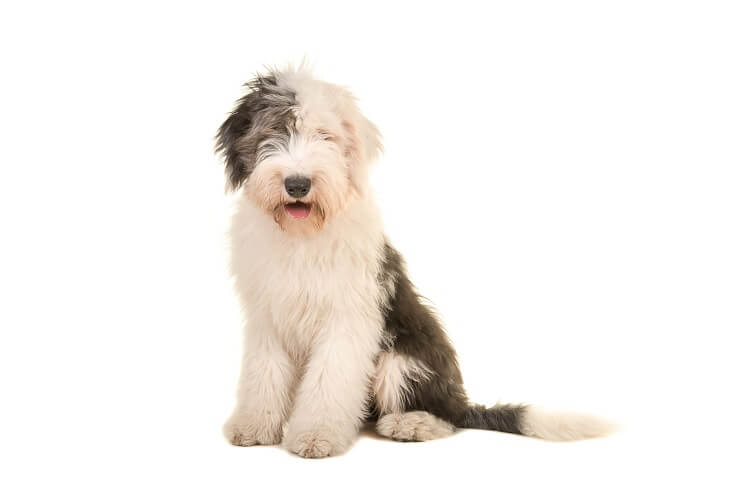
From Adobe Stock
This dog is a big commitment – they will need a lot of care and attention.
The Sheepadoodle is best suited for active families who can give them the time and attention they require. Whilst they are comfortable in any type of home, they prefer a house with a large yard to play in.
Their coat will be fairly high maintenance but won’t shed too much, regular brushing is a must.
Exercise Requirements
Inheriting their high energy from the Sheepdog, they will need lots of exercise. If they don’t get enough exercise, they can start to get boisterous and may start chasing other animals or children.
To avoid this, take them for daily walks (around 90 minutes will be enough). You could even get out your running shoes and take your dog out for a jog!
Take your pooch to a dog park and let her greet and play with other dogs.
Use a leash at first and when you become more confident with your Sheepadoodle you can let them explore the park.
Grooming and Shedding
The Sheepadoodle doesn’t shed as much as you think – this is thanks to the poodle genes.
However, you won’t know what type of coat they will have until they are fully grown. The average Sheepadoodle should be brushed once or twice a week. This prevents any tangles and matting in their soft fur.
It is advisable to trim the hair around their eyes to avoid your pooch bumping into things.
Make sure you trim their nails to avoid overgrowth and splitting. Clean out their ears of wax and debris to prevent ear infections. You should also brush their teeth regularly or give them a dental stick alternative.
Feeding and Diet
Your pup will need a healthy and balanced diet of quality dog food. Protein is needed to keep the body functioning by giving them essential amino acids. Dietary fats are also very important, as they keep your dogs coat healthy and shiny!
When you bring your puppy home, stick to the food the breeder was giving them (this prevents any stomach upsets). You can gradually change this but to start with stick to the original feed.
Puppies should be fed 3-4 times a day to give them the energy they need to grow!
How much you feed your fully-grown pooch will depend on their weight.
If you have a smaller (40-50lb) Sheepadoodle then 2.5 cups of kibble, and a larger one (60lb) will need 3 cups of kibble.
Deciding on what to feed to your dog is a personal choice, just make sure you feed them high quality meals with low artificial filler ingredients like corn syrup. Filler ingredients are often high in carbs and this can be harmful.
The Sheepdog and Poodle are prone to suffering from gastric torsion, so it’s advisable to avoid exercising your dog immediately after feeding and prevent them from eating too quickly.
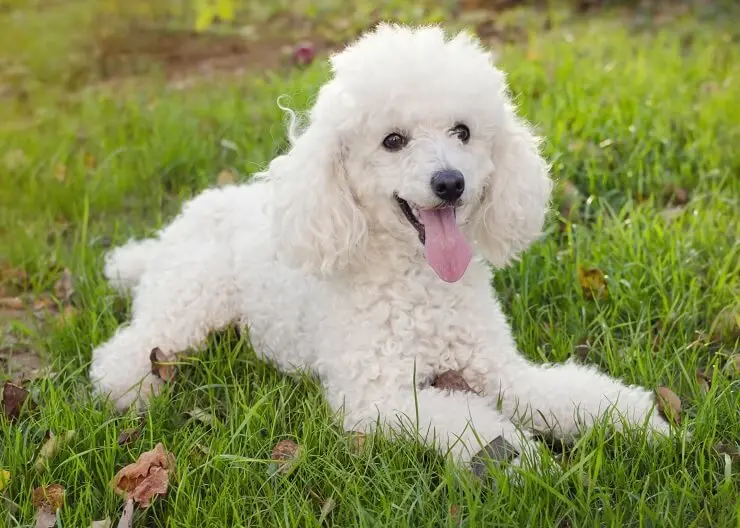
From Adobe Stock
How to Train a Sheepadoodle
This dog is very intelligent.
Both parent breeds are working breeds – this means they are easier to train than other breeds and show more interest in playing with people.
When training your pooch, make sure you use positive reinforcement. It has been shown that positive reinforcement has the best results and doesn’t cause any problematic behaviors. Whereas punishment is likely to lead to problematic behaviors – so avoid using this.
Give your dog a treat or praise when they follow your command.
Start training your dog as soon as you bring them home – the longer you wait the more headstrong they can become.
Sheepadoodles are prone to chasing and biting other animals and children, so its best to nip that in the bud before it develops into a problem. If you tell them off, they will think it has turned into a game, adding fuel to the fire. Instead give them a distraction, like a chew toy or play tug with them.
Be consistent and make sure you give them plenty of other ways to let their energy out.
Early socialization is important too. If a dog is socialized correctly during their early development, they will express fewer undesirable behaviors as an adult, such as anxiety. Take them to puppy class, expose them to a range of dogs, animals, people, and children. Expose them to household appliances that can make excessive noise, such as a vacuum.
As they are so intelligent, they require lots of mental stimulation. Boredom can lead to destructive behaviors like chewing.
Give them some sturdy toys and puzzle feeders to keep their mind active. You can also play games with them, like chase and tug of war!
How Long Does a Sheepadoodle Live?
The average lifespan of a Sheepadoodle is 12-15 years.
Buying a Sheepadoodle
Feel like a Sheepadoodle is the dog for you? The next step is to find a reputable breeder.
When you find a breeder, ask them to see the puppy with the litter and Mom. If they don’t let you, chances are they are not trustworthy.
Seeing the pup with Mom and their siblings will give you an idea of their temperament. Its best to find a breeder who promotes maternal care in their Dams.
Breeders should also provide you with health certificates for the puppy’s parents and will let you know about any vaccinations the puppy has had. Some breeders even take part in genetic screening schemes that reduce the prevalence of common health issues, like hip dysplasia.
How Much Does a Sheepadoodle Cost?
You should expect to pay between $1000-$3000 for a Sheepadoodle puppy.
Breed Summary Table
| Breed Characteristics | |
| Size: | 13-28 inches tall |
| Weight: | 45-85lb |
| Lifespan: | 12-15 years |
| Coat: | Medium length, straight or curly |
| Color: | Black and white, red and white, or solid gray |
| Do They Shed: | Low to medium shedding |
| Temperament: | Calm, gentle, obedient and friendly |
| Intelligence: | Very intelligent |
| Socialization: | Dog and pet friendly, but will need puppy classes |
| Destructive Behavior: | Prone to chewing when bored or lonely |
| People Skills: | Very sociable and friendly |
| Good with Children: | Great with kids |
| Activity Levels: | Very energetic, will need exercise every day |
Summary
The Sheepadoodle is best suited for an active family who can keep up with the high levels of energy this crossbreed will have.
It doesn’t like being left alone for too long, so it’s best to have someone home most of the day to keep them company. This dog will love a fenced back yard to run around in.
They are very playful and will need regular mental stimulation. Fetch, chase, and tug of war are all games they love.
Grooming is a gray area with cross breeds – there is no way to tell what type of coat they will have until they are fully grown. Either way, brush them at least once a week.
If you are looking for a smart dog that will show you their love, this cross breed is the dog for you!
More Old English Sheepdog and Poodle Mixes
Want an Old English Sheepdog mix or Poodle mix but aren’t keen on the Sheepadoodle? Check out these other hybrid dog breeds:



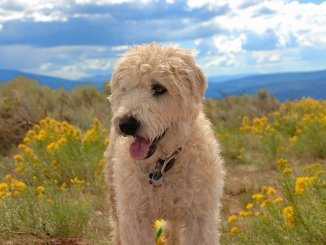
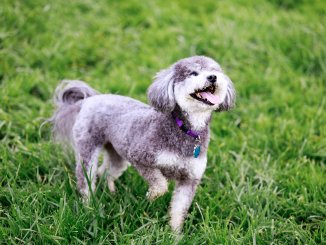
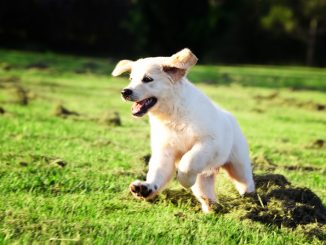
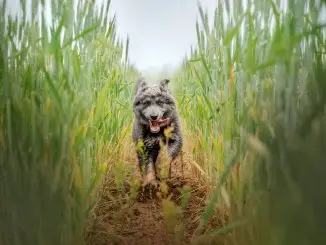
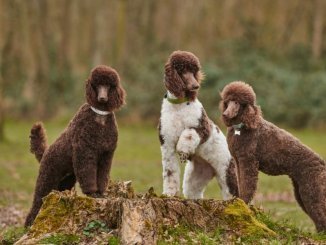
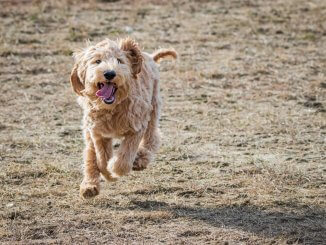
Very helpful info,,,,
We have a Sheepadoodle puppy that is close to 4 months old which we have had for a month. She’s very smart, eager to please and crazy cute. She is just about fully housebroken and rings a bell when she wants to go outside. She is afraid of noises outside though and sometimes doesn’t want to go for a walk. She walks better with my other small dog but will still get scared and stop or turn to go home. Any ideas on how to handle this issue? I am an avid walker and it would be great for both of us to walk together so I don’t want to traumatize her.
Okay, it’s been almost 3 years…has this gotten way better? We are getting a Sheepadoodle that will 7 weeks old. I am soooo nervous…any help is greatly appreciated!